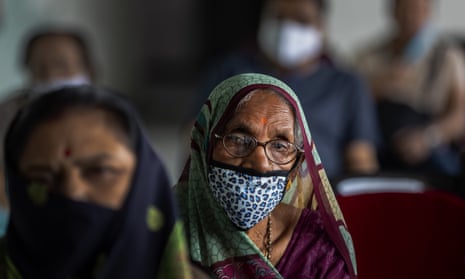Severe Covid-19 vaccine shortages have hampered India’s plan to administer jabs to all adults, with fewer then half of India’s states able to begin vaccinating over-18s amid warnings the shortfall could last months.
Over the weekend, more than 600 million Indians became eligible for the coronavirus vaccine in a policy that was introduced in the wake of a deadly second wave hitting the country last month.
However, as many had predicted, vaccine shortages have proved a huge impediment to the rollout and so far only 12 of India’s 36 states and union territories have had enough vaccines in stock to begin vaccinating over-18s, and many only in small numbers. Previously the jabs had only been available to people over 45 and those with co-morbidities.
By Sunday, according to the ministry of health, only 86,023 people aged between 18 and 45 had received their first vaccine. The state that had inoculated the highest number of adults was Gujarat, the home state of the prime minister, Narendra Modi, where he was formerly chief minister and which is ruled by his Bharatiya Janata party (BJP).
The government has been accused of complacency and a lack of forward planning when it came to ensuring there would be enough vaccines for its population of more than 1.3 billion. While other countries had put in sizeable orders last year, the Indian government only placed its first orders in January for just 15.5m vaccines from the Serum Institute, which makes the Oxford/AstraZeneca vaccine (known as Covishield in India, the most widely administered vaccine in the country), and Bharat Biotech, which makes the indigenous vaccine Covaxin.
Adar Poonawalla, the chief executive of the Serum Institute, told the Financial Times on Sunday that India’s severe shortage would continue “for months”, probably until July, because the Modi government had not placed orders in time so they had not boosted manufacturing capacity earlier.
In a statement on Monday, Poonawalla added: “Vaccine manufacturing is a specialised process. It is therefore not possible to ramp up production overnight. We also need to understand that the population of India is huge and to produce enough doses for all adults is not an easy task.”
Poonawalla confirmed it had orders from the central government for 110m doses of Covishield, and that a further 110m doses would be provided to states and private hospitals “in the next few months”.
State governments are responsible for procuring their own vaccines for people aged 18 to 45 and most have reported delays in requested stocks from the Serum institute.
The government had also refused to allow Pfizer to register its vaccine in India months ago, despite its approval in the US and the EU. It told Pfizer it first needed to carry out trials in India, so the company withdrew its application in February. The Pfizer chairman, Albert Bourla, confirmed on Monday it was in talks with the Indian government about approval of the vaccine.
The first batch of 150,000 doses of India’s Sputnik vaccine also arrived in India on Sunday.
While India’s Covid-19 cases have continued to surge at record-breaking pace, with the country registering 368,147 new cases and a further 3,417 deaths on Monday, the rate of vaccinations across the country has fallen to its lowest levels.
Over the past 15 days, the daily rate of vaccinations fell from an average of 3.2m a day to 2.3m a day. If India wants to vaccinate everyone over the age of 18 this year, 7.5m doses will be needed to be administered every day.
In Mumbai, one of the cities worst hit by Covid-19, only five vaccine centres had stocks for 18-45s, and on the first day of the rollout only about 1,000 people received their jabs. In the state of Odisha, only 96 people between 18 and 45 received their vaccine on the first day.
Stocks were so low in Mumbai by Monday that vaccines were suspended for people over 45. In India’s most populous state of Uttar Pradesh, vaccines for 18-45s were administered in only seven districts. The Delhi government began giving the vaccine to over-18s on Monday, with booths set up at 77 schools across the city but many struggled to get a slot on the app.
In the wake of the slow vaccine programme and the voracity of India’s second wave, experts warned that vaccines would do little to curb the surging number of cases in India.
“If we think we are going to control the second surge with the vaccine, we are sadly mistaken,” said the Indian virologist Shahid Jameel, who serves on India’s Covid-19 taskforce, speaking to India’s Mojo news. “The time for that has passed … what the vaccine taken now will do is reduce the magnitude of the third wave. The focus now should be on saving lives. ”
